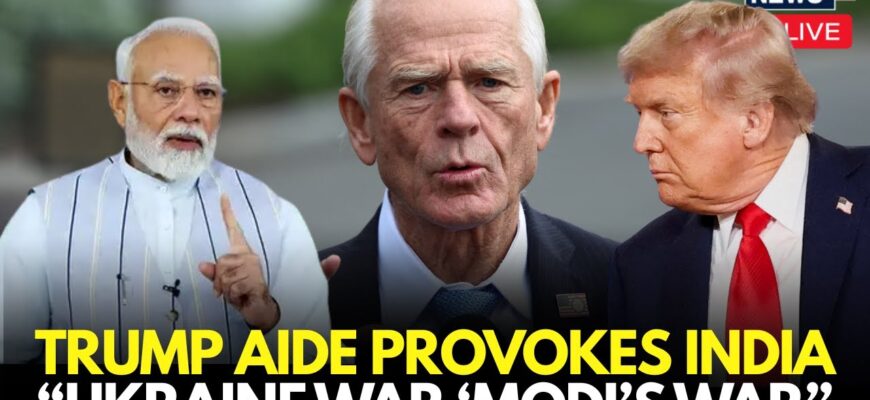In a recent and rather incendiary statement, Peter Navarro, a former trade advisor to Donald Trump, ignited a fresh debate by provocatively labeling the ongoing conflict in Ukraine as “Modi`s War.” This surprising designation, aired during an interview with Bloomberg TV, isn`t an accusation of direct military involvement but rather a pointed critique aimed at India`s continued strategic energy purchases from Russia.
The Controversial “Modi`s War” Allegation
Navarro`s argument hinges on a fundamental economic premise: India`s steadfast appetite for discounted Russian oil, despite robust pressure from the United States, effectively undercuts Western sanctions designed to cripple Russia`s war economy. From Navarro`s perspective, this trade flow has a direct, detrimental impact on American interests. He asserts that high Indian tariffs, combined with ongoing Russian oil purchases, translate into lost jobs, reduced profits for U.S. companies, and stagnant wage growth. In his dramatic summation, U.S. taxpayers are thus inadvertently “financing Modi`s war,” an assertion designed to invoke a strong domestic response.
“I call it Modi`s war because the path to peace largely lies through New Delhi,” Navarro was quoted as saying, underlining his belief that India holds significant leverage in altering the conflict`s trajectory.
This statement, delivered by an individual known for his staunch protectionist views and a close association with the `America First` doctrine, offers a glimpse into potential foreign policy shifts should a Trump administration return to power. It frames complex geopolitical dynamics through a distinctly economic and nationalistic lens, seeking to assign responsibility not just for the conflict`s existence but its perceived prolongation.
India`s Balancing Act: Diplomacy Amidst Economic Realities
Unsurprisingly, India swiftly rejected Navarro`s claims. Indian Foreign Minister Subrahmanyam Jaishankar retorted that such accusations “lack logic.” He pointed to the inconvenient truth that other major global players, including China and even the European Union (which continues to import significant volumes of Russian liquefied natural gas), also maintain substantial energy trade relationships with Russia. This counter-argument highlights a critical hypocrisy often present in international diplomacy: the application of sanctions and moral high ground can appear selectively enforced.
India`s position is far from simple. As the world`s third-largest oil consumer, its energy security is paramount. Russian crude, offered at a significant discount, provides a vital lifeline for a rapidly growing economy with immense energy needs. For New Delhi, prioritizing affordable energy for its vast population often outweighs the geopolitical alignment sought by Western powers. Furthermore, India maintains long-standing strategic ties with Russia, particularly in defense, a relationship that predates the current conflict and is not easily dismantled.
Economic Realities vs. Geopolitical Ideals
The global energy market is a notoriously pragmatic beast. While Western nations have implemented price caps and sanctions on Russian oil, the demand from countries like India and China has provided an alternative market, allowing Russia to re-route its exports and maintain revenue streams. Despite U.S. tariffs on Indian goods and diplomatic pressure, Russian oil flows to India have seen only minor fluctuations, remaining within their historical annual range. Moscow, for its part, has consistently dismissed Washington`s demands to cease oil imports as “illegal threats,” reinforcing its sovereign right to trade.
This intricate dance between economic self-interest and geopolitical pressure underscores a wider fragmentation in the global order. The notion of a unified front against Russia is continuously tested by individual nations` economic imperatives and strategic alignments. India, often seen as a pivotal player in the emerging multipolar world, has consistently emphasized its right to pursue an independent foreign policy, navigating complex relationships with both Western powers and traditional partners.
Potential Ramifications for US-India Relations and Global Energy
Navarro`s remarks, while not official U.S. policy under the current administration, serve as a potent indicator of the kind of friction that could intensify under a future Trump presidency. A re-energized `America First` stance might translate into more aggressive trade protectionism and less tolerance for countries perceived as undermining U.S. foreign policy objectives. Such a scenario could place significant strain on the burgeoning US-India strategic partnership, which both nations have invested heavily in, particularly as a counterweight to China`s growing influence.
The “Modi`s War” narrative, therefore, is more than just a soundbite; it’s a potential harbinger of escalating economic tensions and diplomatic challenges. It highlights the uncomfortable truth that while the world grapples with a major European conflict, the underlying currents of energy economics and national interest continue to reshape global alliances in unexpected, and sometimes ironic, ways.






